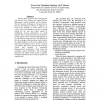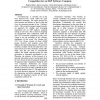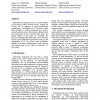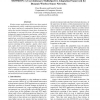HICSS
2008
IEEE
14 years 6 months ago
2008
IEEE
The wealth of data available about a person’s computer activity is immense. Digital forensic sciences have progressed such that tools are readily available to recover deleted da...
HICSS
2008
IEEE
14 years 6 months ago
2008
IEEE
This paper builds upon action and design research aimed at enhancing scholarly community and conversation in a graduate school setting. In this paper we focus on knowledge sharing...
HICSS
2008
IEEE
14 years 6 months ago
2008
IEEE
Global Virtual Teams (GVTs) – teams with geographically and temporally dispersed members who heavily rely on computer-mediated communications (CMC) – face significant collabor...
HICSS
2008
IEEE
14 years 6 months ago
2008
IEEE
Semantic Web research aims at bridging the gap between how humans and agents process information readily available on the Internet. One of the great challenges to this goal lies i...
HICSS
2008
IEEE
14 years 6 months ago
2008
IEEE
This project uses empirical data to provide insights into the impact of open standards. This work moves beyond the existing literature by considering a large number of open standa...
HICSS
2008
IEEE
14 years 6 months ago
2008
IEEE
“Crowdsourcing” is currently one of the most discussed key words within the open innovation community. The major question for both research and business is how to find and lev...
HICSS
2008
IEEE
14 years 6 months ago
2008
IEEE
We present a methodology to engineer services in real-time information environments. We evaluate, combine and enrich traditional techniques and methodologies such as New Product D...
HICSS
2008
IEEE
14 years 6 months ago
2008
IEEE
Containing much valuable information, networks such as the World Wide Web, social networks and metabolic networks draw increasingly attention in scientific communities. Network cl...
HICSS
2008
IEEE
14 years 6 months ago
2008
IEEE
Information technology has been a central enabler in the process toward network society. Despite the critical role of computers in inter-organizational arrangements, coordination ...
HICSS
2008
IEEE
14 years 6 months ago
2008
IEEE
Wireless sensor applications (WSNs) are often required to simultaneously satisfy conflicting operational objectives (e.g., latency and power consumption). Based on an observation...




